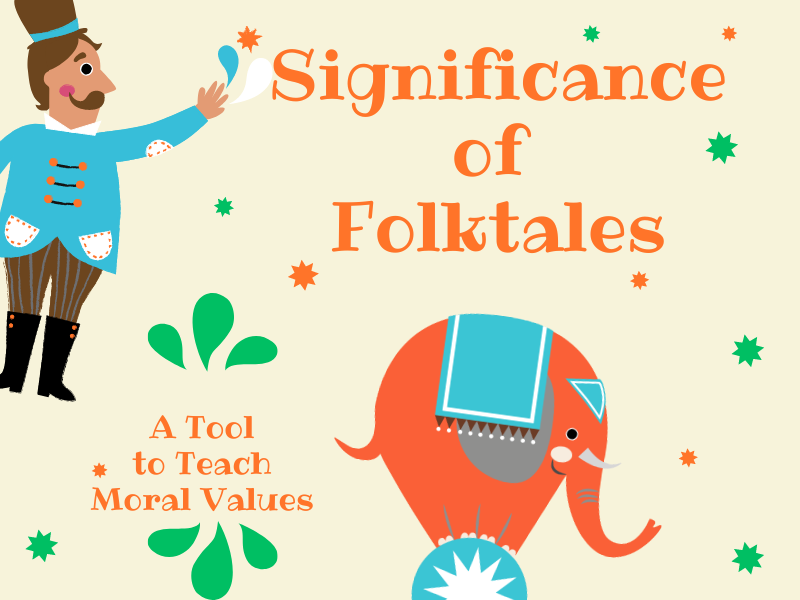Ever thought what’s the significance of folktales in teaching moral values to children? For generations, folktales have woven a spellbinding tapestry of narratives that transcend time and culture. These captivating stories, cherished by listeners of all ages, hold a special place in the realm of storytelling. But there is more to folktales than mere entertainment. Further, they possess a profound significance in shaping the moral compass of children.
Through the enchanting characters, imaginative settings, and captivating plots of folktales, young minds are transported to magical worlds. There, lessons of courage, kindness, honesty, and perseverance get unfold. These timeless tales serve as powerful tools for instilling important life lessons and moral values in children.
Every twist and turn of the story encourages children to ponder the consequences of actions, explore the complexities of right and wrong, and develop a sense of empathy and understanding. Folktales create a safe space for children to navigate moral dilemmas, fostering critical thinking skills and ethical decision-making.
Folktales are a tool for teaching Moral values
The beauty of folktales lies in their universality. Regardless of cultural background or language, these stories carry universal truths that resonate with the hearts and minds of children worldwide. They provide a rich tapestry of diverse characters and settings. It allows children to develop a deep appreciation for different cultures and perspectives.
In a world where values and morals are often challenged, folktales serve as an anchor, reminding children of timeless virtues and guiding principles. These stories ignite the imagination, spark curiosity, and inspire children to embody the qualities of courage, compassion, honesty, and resilience.
As we delve into the remarkable significance of folktales in teaching moral values to children, we invite you to join us on a journey through the enchanting world of storytelling. Together, let’s celebrate the power of folktales in shaping young hearts and minds. Indeed, We want to nurture a generation guided by empathy, integrity, and wisdom.
The Power Of Story Telling

Storytelling has an incredible power to captivate, inspire, and shape young minds. In particular, folktales have stood the test of time as timeless conduits for imparting moral values to children. These captivating tales passed down through generations, hold a special place in our collective cultural heritage. Vibrant characters, imaginative settings, and engaging plots effortlessly transport children into imaginative worlds within folktales, where they explore moral dilemmas and learn important life lessons. Immersed in these enchanting narratives, children discover the teachings of compassion, honesty, resilience, and other essential moral values. The magic of storytelling brings these values to life, sparking deep reflection, empathy, and character development within young readers. With each turn of the page, folktales become catalysts for shaping young hearts and minds. In addition, it helps in instilling a strong moral compass that will guide children on their journey to becoming compassionate, responsible, and ethically-minded individuals.
Moral Lessons in Folktales
Folktales have long been revered as powerful vessels of moral lessons, imparting timeless wisdom to readers of all ages. Besides, These captivating stories transport us to whimsical worlds where characters embark on transformative journeys, navigating moral dilemmas and teaching us valuable life lessons. With each twist and turn of the plot, folktales engage our imagination and spark introspection. It feels like inviting us to reflect on our own values and actions. Through the vibrant narratives and relatable characters, we witness the consequences of greed, the rewards of kindness, the importance of honesty, and the triumph of perseverance. Folktales, like beacons of light, guide us through complex ethical landscapes, urging us to make choices aligned with virtue and empathy.
As we immerse ourselves in these enchanting tales, we discover that the lessons they teach transcend time and culture. It serves as a guiding principle for building the character of children. Moreover, it helps in nurturing empathy and fostering a sense of responsibility towards ourselves and others. So let us journey into the rich tapestry of folktales, where moral lessons abound, and allow the wisdom they hold to shape our lives for the better.
Conclusion
Folktales have a magical way of weaving together the strands of imagination, culture, and moral teachings. They leave an indelible mark on the hearts and minds of children. These captivating narratives serve as gateways to enchanting worlds, where heroes and heroines embark on extraordinary journeys and confront moral dilemmas that resonate with young readers.
Folktales ignite curiosity and inspire moral reflection. They present children with dilemmas and challenges that require thoughtful decision-making. As young readers navigate these intricate storylines, they learn to consider the consequences of actions and develop a sense of right and wrong. Furthermore, These stories become valuable tools for nurturing empathy, integrity, and compassion within children.
By embracing the significance of folktales in teaching moral values, we embark on a journey to share these timeless treasures with children. We empower them to navigate the complexities of life with wisdom, empathy, and integrity. Through the power of storytelling, we inspire young hearts to embrace kindness, courage, honesty, and resilience.
Read on THE JOURNEY OF ETHNIC STORIES IN OUR CHILDREN’S BOOKS

